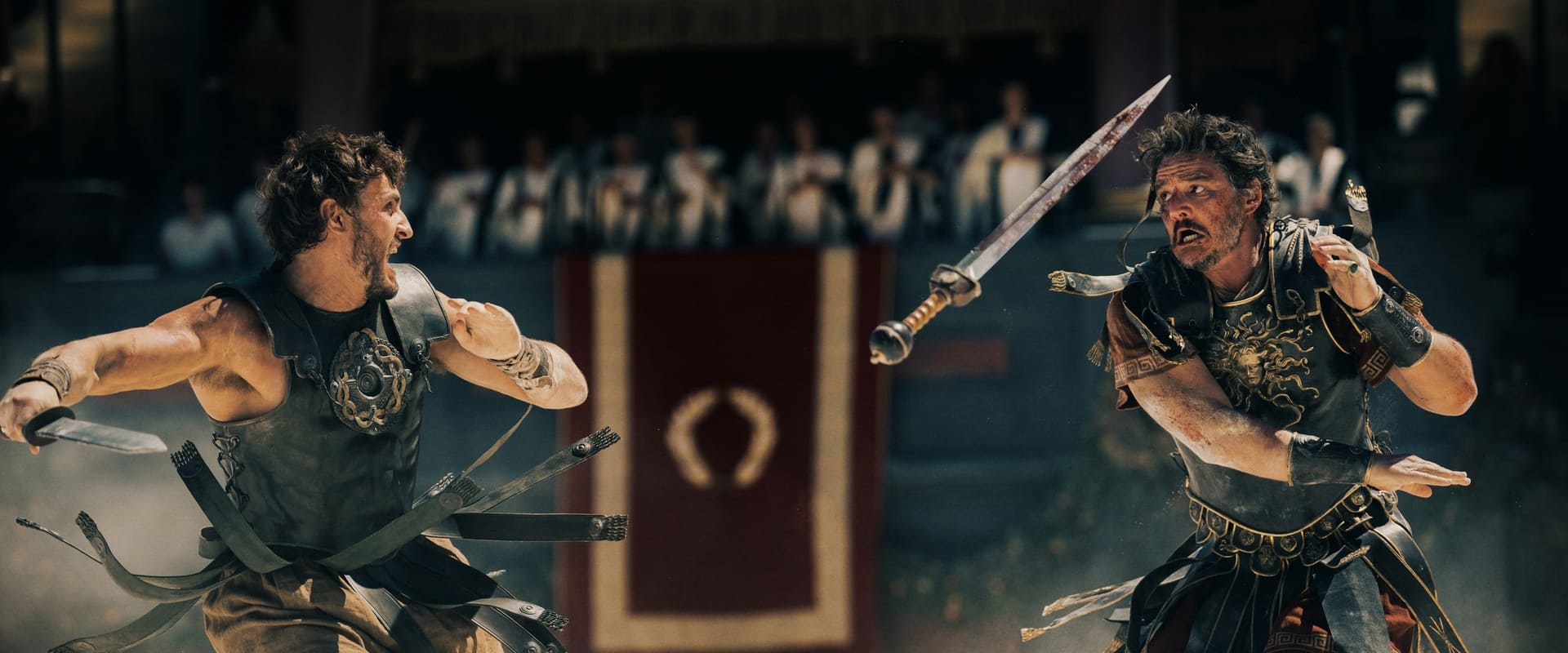Let’s start where the air gets thin and the coliseum fills with water: be honest—did you ever expect Ridley Scott, the master of “muscular history,” to burst gladiatorial combat wide open with the introduction of actual sharks? Gladiator II, for all its sweat-drenched howls of reverence toward the original, is less Maximus’s solemn march to myth than a glittering, full-throttle fever dream—part sequel, part spectacle, and not altogether sure which side it wants to fight for.
Paul Mescal’s Lucius—exiled prince, teeth-baring brawler, heir to Maximus’s confused legacy—enters with a kind of bottled-up rage that promises something volcanic. Unfortunately, you find yourself scanning him for traces of Russell Crowe’s ferocity, and what you get is…enough. Not soulless, not wooden—the boy can glower—but the magisterial weight is gone, replaced with an off-brand intensity that does the job right up until the script kneecaps him with deja-vu. Gladiator II is haunted by ghosts, and not just the digital kind. It wants so badly to be the epic of old, you half expect someone to start mumbling about Spaniards while a wash of Hans Zimmer’s leftover temp scores smothers the proceedings. In the moments when the film risks breaking free—where surreal violence runs riot, where monkeys and rhinos and yes, sharks turn the Roman games into high camp—there’s a kind of hyperactive glee that says more about the state of blockbuster cinema than any chest-thumping pronouncement about Rome.
But then in stalks Denzel. Washington, godlike among mortals, struts through every one of his scenes as Macrinus with the sort of insouciant, delicious menace that reminds you why movies need stars. The plot may be an overstuffed mosaic of court backstabbing and rebellion—twin emperors doing a Beavis and Butt-Head routine, Connie Nielsen finally given a pulse after years in exile—but if Ridley’s going to let the whole thing crumble into spectacle for spectacle’s sake, at least he’s wise enough to let Denzel reign over the mayhem like the last adult in a sandbox. Every time the narrative threatens to drown in self-seriousness, Washington flashes you that half-smirk and you’re reminded why blockbusters once thrilled instead of numbed.
There’s a visceral pleasure when Ridley flexes those old muscles: The whipping pace of that opening siege, a spear bolt slicing a poor unfortunate into pulp—here, for a moment, is the Ridley who can make violence lyrical, who understands the hard pop of impact, blood blooming with the sound mix cranked to eleven. The Colosseum, too, is rendered as a nightmare wonderland—half-myth, half-WWE, waterlogged and teeming with the kind of lunatic invention that belongs less to Roman history than some sleepless adolescent’s Red Bull-fueled storyboards. Gladiators swatting at monkeys, a rhinoceros run amok, sharks circling for that last cheap pop of animalistic terror; say what you will about taste, but it’s never, ever boring.
But for every bravura setpiece there’s a pothole. Mescal, as Lucius, is sold as the next coming of Maximus but keeps getting bogged down by a script so eager to check boxes it forgets to care about its own hero. The film zips by on technical bravado—I’ll give you that—yet trades in genuine feeling and mythic poetry for the sort of generic “chosen one” heroism fit for a screensaver. Connie Nielsen at least gets the opportunity to act, and Joseph Quinn and Fred Hechinger seem to be having a delicious time as the empire’s maladjusted co-emperors, but even their lunacy is no replacement for the sweaty, delirious sense that you’re watching anyone struggle for their soul.
Gladiator II is louder, goofier, more deliriously self-indulgent than its predecessor, but don’t mistake bigger for better. The film is a popcorn feast of swords clanging and beasts mauling—think 300 with a Tarantino hangover and an all-star cast slumming it in togas. Ridley, in his late career, barrels through history like a man on a deadline, piling up practical effects, digital blood spatter, and the sort of gleeful disregard for plausibility that only a director this old and this sure of himself could muster. You can practically hear him yelling, “To hell with restraint—let’s flood the arena and see what bites!”
And maybe that’s the fate of blockbusters now: franchise sequels cobbled together from expired glory, all muscle memory and bellow, hoping the audience is too dazzled by the fireworks to notice the soul has gone for a coffee break. The original Gladiator had a core of poetic tragedy under its posturing; this one has sharks. Sometimes literally. All the pieces are in place, and yet what sticks with you isn’t the weeping of history, but the manic, almost deranged joy of watching men in loincloths wrestle primates as emperors cackle from above.
Is Gladiator II a good movie? Not really. It’s mildly entertaining—silly, sturdy, noisy, beautiful, asinine. But here’s the real miracle: you leave the theater, still chuckling at Ridley’s nuclear-level “who cares?” energy, and you realize you’ve been more entertained by his lack of restraint than you ever would have been by another round of Maximus clones looking for lost honor. Scott doesn’t care, and for a wild two-plus hours neither do you.


